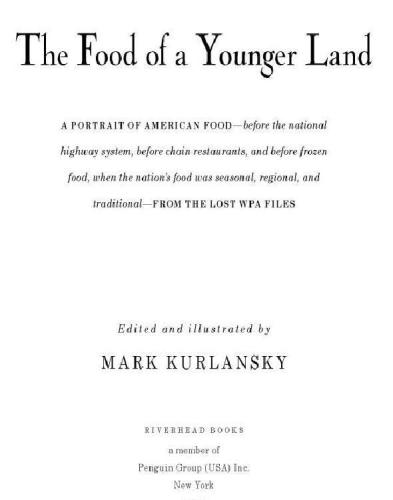
The Food of a Younger Land
A Portrait of American Food--Before the National Highway System, Before Chain Restaurants, and Before Frozen Food, When the Nation's Food was Seasonal Regional, and Traditional--from the Lost WPA Files
کتاب های مرتبط
- اطلاعات
- نقد و بررسی
- دیدگاه کاربران
نقد و بررسی

March 16, 2009
A genuine culinary and historical keepsake: in the late 1930s the WPA farmed out a writing project with the ambition of other New Deal programs: an encyclopedia of American food and food traditions from coast-to-coast similar to the federal travel guides. After Pearl Harbor, the war effort halted the project for good; the book was never published, and the files were archived in the Library of Congress. Food historian Kurlansky (Cod
; The Big Oyster
) brought the unassembled materials to light and created this version of the guide that never was. In his abridged yet remarkable version, he presents what some of the thousands of writers (among them Eudora Welty, Zora Neale Hurston and Nelson Algren) found: America, its food, its people and its culture, at the precise moment when modernism and progress were kicking into gear. Adhering to the administrators' original organization, the book divides regionally; within each section are entries as specific as “A California Grunion Fry,” and as general and historical as the one on “Sioux and Chippewa Food.” Though we've become a fast-food nation, this extraordinary collection—at once history, anthropology, cookbook, almanac and family album—provides a vivid and revitalizing sense of the rural and regional characteristics and distinctions that we've lost and can find again here.

May 5, 2009
Once unique and diverse, American regional cuisine has been homogenized by franchising, globalization, and frozen foods. During the 1930s, the WPA-funded Federal Writers' Project documented local foods, preparation, and eating habits-but research was abandoned owing to the onset of World War II. Best-selling author Kurlansky (Cod; Salt) draws on the WPA files to present local recipes, essays, poetry, and lists of slang. He contextualizes the pieces and provides illustrations throughout. Verdict: With renewed public interest in the Great Depression, this fascinating portrait of American history and food culture will be popular, especially among Kurlansky's fans. [See Prepub Alert, LJ 1/09.]-Courtney Greene, DePaul Univ. Lib., Chicago
Copyright 2009 Library Journal, LLC Used with permission.

March 15, 2009
Just what we need in hard times, recipes for booya, mullet salad, Georgia possum and taters, kush, and Montana fried beaver tail. Kurlansky, the author of best-selling books about salt, cod, and oysters, discovered these gems in a two-foot-high stack of the raw, unedited manuscripts for an inspired but never completed WPA endeavor titled America Eats. As he explains in his invigorating introduction, the Federal Writers Project sent starving writers of all stripes (Nelson Algren, Zora Neale Hurston, Eudora Welty, and other who qualified just because they could type) across the country to gather information about American cookery and the part it has played in national life. The results are vivid and playful dispatches from pre-interstate, pre-fast-food America, when food was local and cuisine regional. Kurlansky selected zesty writings, factual and imaginative, describing barbecues, fries, and feasts; profiling families; and defining New York City luncheonette slang (blind em means two eggs fried on both sides). Fun, illuminating, and provocative, thishistoric reclamation appearswhile were in the midst of the worst financial crisis since the oneFranklin D. Roosevelt fought with his job-creating stimulus package andwhile weregrappling witha plague of unsafe foodand environmental woes associated with industrial agriculture. But dont despair.Whip up Ethels Depression Cake, and throw a bailout party.(Reprinted with permission of Booklist, copyright 2009, American Library Association.)

























دیدگاه کاربران